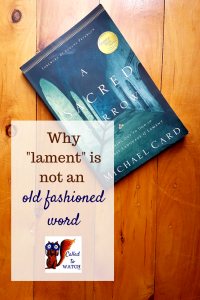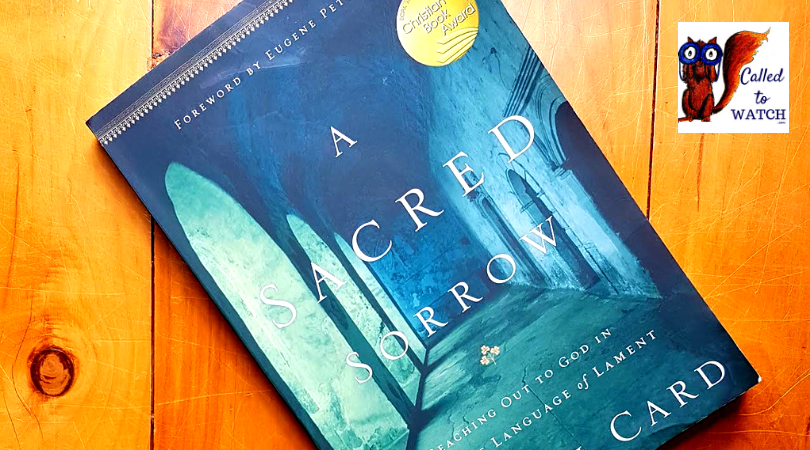I’ve recently finished A Sacred Sorrow: reaching out to God in the lost language of Lament. This book by Michael Card was given to me by a friend after my mum was diagnosed with pancreatic cancer.
I must admit I thought I knew quite a bit about turning to God in the midst of sorrow, but this book helped clarify and stretch my understanding.
Most of all, it helped me understand why it’s important to cry out to God – even when I’d prefer just to ‘move on’.
If you want to an overview of the book, read on. If you want to skip to my assessment, scroll down!
A Sacred Sorrow: the lost language of lament
What is lament?
In the garden of Eden we experienced both God’s presence and His hesed: a Hebrew word often translated as ‘loving kindness’. It was what we are created for. To know God and experience his loving kindness. After the fall these were torn away from us.
When we lament, we ask two questions:
- God, where are you? (Presence)
- God, if you love me then why? (where is your hesed?)
Why do we need to lament?
If we refuse to lament, we are not acknowledging our true identity (as sinful people cut off from God, created for something more). We can only truly worship if first we lament, because it is only in the wilderness that we realise our lostness and the depth of our salvation.
Failing to lament when we suffer cuts us off from others too. How can we truly enter into relationships if we are not interested in sharing our hurts? How can we love the world if we refuse to be broken for it?
Lament creates the only trustworthy bridge by which we can reach God over our brokenness.
Where can we find examples of lament?
Job
“Job holds on to the God he believes he knows, and is granted one of the most stunning images of Jesus in the Old Testament.
Without the pain, he would never have known the need.”
David
“… David’s life pressed him to make one of two choices: avoid the forsaken sense of suffering it causes and find a substitute for intimacy with God, or stubbornly refuse to let go of the loneliness and continue on the path toward an ever-increasing, continuously painful, unheard-of intimacy with God.”
Jeremiah
“…Jeremiah overflows in the kind of praise that only pours from lament.
To be sure, it is a bruised and bloody praise… but it is a praise that can now hope all things, having been forced to let go of everything.”
Jesus.
“When He lamented, “why have you forsaken me?” Jesus voiced all our laments.
The heartbreaking truth is… God did forsake Him.
…(and so) He won for us the assurance of Presence.”
Conclusion
Card goes onto explain that often God is using us right when it feels like He has abandoned us – just as it was for Jesus on the Cross.
Also, lament is only for a season. Jesus’ lament bought us a future which will be completely free from it.
The book concludes with many Biblical and extra-Biblical examples of laments. These appendices form just under a third of the entire page count.


So… is this book worth reading?
This is the sort of book you read slowly, mulling over each sentence. Don’t let that put you off, however, as the chapters are very short (generally no more than 3-4 pages). The book (discounting the appendices) itself is very slim.
There are times when I thought Card could be a bit clearer in his summations and conclusions. I found the first few chapters to be a better conclusion than the actual conclusion. Then again, this is not a ‘how to’ book or even a theological treatise. It is a journey through lament and tears and what part they have in the Christian life.
Card helped me to see four people (Job, Jeremiah, David and Jesus) who I thought I knew reasonably well, in a new light. At times I felt as though some of his ponderings were slightly unsubstantiated, but they were definitely credible and not contrary to the Biblical account.
This is a book which will hold up under continual re-reading. It is a comfort for those grappling with where exactly tears fit into their relationship with God. For others (myself included) who have explored this subject in the past, it is a fresh approach which will deepen your understanding.
//Have you read any books lately that have helped you through life? Will you read this one?
PS: Enjoyed the post above? Get the next one delivered straight to you! Sign up for email notifications
I’m also on Facebook, Pinterest & Twitter! Meet me there for more interesting reads, resources and community.

